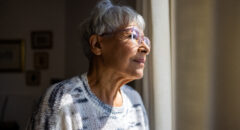 As the aging population continues to grow, so will the prevalence of Alzheimer’s disease in Blacks. Worse yet, studies show that Blacks will be hit hardest.
As the aging population continues to grow, so will the prevalence of Alzheimer’s disease in Blacks. Worse yet, studies show that Blacks will be hit hardest.
According to the Alzheimer’s Association’s 2018 Alzheimer’s Disease Facts and Figures, an estimated 5.2 million Americans have Alzheimer’s disease and 1.1 million of them are Black-American.
Alzheimer's disease is the sixth leading cause of death in the United States. However, it is the fourth leading cause of death in older Blacks.
Moreover, where you live can impact how likely you are to die as a result of Alzheimer’s.
For example, deaths from Alzheimer’s in Mississippi are 45.8 percent higher than in any other state. On the other hand, New York residents with Alzheimer’s experience the lowest death rate at 13.1 percent.
What is Alzheimer’s Disease?
Alzheimer’s disease is a devastating, progressive disease. It slowly destroys memory and thinking skills. It also causes challenging behavior problems, and eventually leads to an inability to carry out simple tasks.
Most people with Alzheimer’s have a late-onset type with symptoms appearing in their mid-60s. Early-onset Alzheimer’s disease is very rare, occurring in individuals between 30 to 65 years of age.
Why are Blacks Hardest Hit?
Scientists don’t yet fully understand what causes Alzheimer’s disease in most people.
However, research suggests Alzheimer's disease is caused by a combination of genetic, health, lifestyle, and environmental factors.
The importance of these factors in increasing or decreasing the risk of developing Alzheimer’s differs in Blacks compared to whites.
For example, Alzheimer's disease can be associated with vascular risks. These are medical conditions that impact the blood vessels. Risks include heart disease, stroke, and high blood pressure, as well as diabetes and obesity.
Blacks experience higher rates of vascular disease, diabetes, and obesity compared to whites, putting them at greater risk of developing Alzheimer’s disease.
Problems with genes are also associated with Alzheimer's disease.
Scientists have identified rare changes (mutations) in three genes that virtually guarantee a person who inherits them will develop Alzheimer's.
But these genetic mutations account for less than 5 percent of Alzheimer's disease. Research suggests the impact of various genetic risk factors for Alzheimer's disease may be different among Blacks than for whites.
Signs and Symptoms of Alzheimer's
Don't panic if you misplace your car keys or forget where you park the car. This is a normal sign of memory loss related to aging. However, if you forget how to use your keys, that’s a serious sign of memory loss.
The first symptoms of Alzheimer's vary from person to person.
Memory problems are typically one of the early signs of cognitive, or mental, impairment. It can be related to Alzheimer's disease.
Also, difficulty with non-memory aspects of reasoning, such as word-finding, vision or spatial issues, and impaired reasoning or judgment, may signal the very early stages of Alzheimer's.
As the disease progresses, people experience more significant memory loss and other cognitive difficulties.
What Can Blacks Do to Reduce Risk of Alzheimer's?
Some sources claim that products such as coconut oil or dietary herbal supplements such as Protandim® can cure or delay Alzheimer's. However, there is no scientific evidence to support these claims.
There is evidence that a healthy diet, physical activity, appropriate weight, and no smoking can lower the risk of many chronic diseases and help you stay healthy as you age.
Scientists continue to explore the possibility that a healthy lifestyle might also slow down, or even prevent Alzheimer’s.
They are also studying the role of social activity and intellectual stimulation in Alzheimer's disease risk.
Currently, there is no cure for Alzheimer's, but early and accurate detection and diagnosis are crucial.
If you are concerned that you or someone you love may have Alzheimer’s or cognitive impairment click here to take the dementia risk assessment quiz.
Also, if you are 65 and older or have a family history of Alzheimer’s, ask your healthcare provider about a “check-up from the neck up” to check your brain health and cognitive function.
Just as proactive screening for cancer, heart disease, or vision problems, a regular cognitive assessment can help you and your healthcare provider identify and manage changes early.






